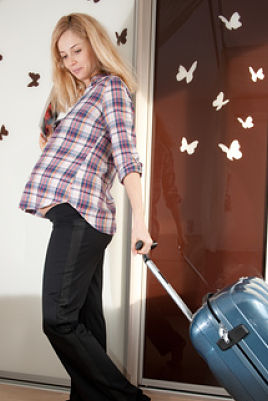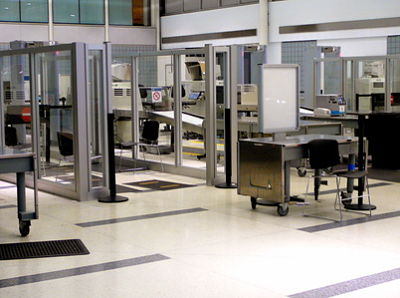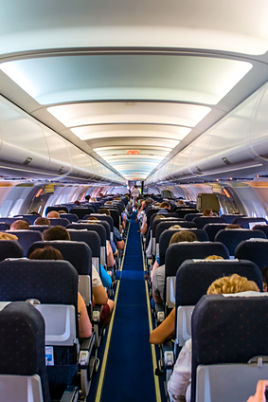Flying When Pregnant -
How To Keep Yourself & Your Bump Safe and Comfortable
The idea of flying when pregnant may be a little daunting.
Is it safe for you and your baby? How late into your pregnancy can you fly? Is it safe to go through security screening at the airport?
On this page, we answer all these questions... plus we share with you our tried and tested tips for staying comfortable on your journey and getting your babymoon off to the best possible start.
Flying When Pregnant Is Generally Considered Safe During a Healthy Pregnancy
Of course, you should speak to your doctor before making any plans, but unless your pregnancy is considered 'high risk' in some way, then you should be cleared for take-off!
Conditions that may lead your doctor to caution against flying when pregnant include
- A history of blood clots
- Placental insufficiency
- Severe anemia
- Sickle Cell disease
- Risk of premature labor
Get a Letter From Your Doctor and Keep it With You
To avoid problems when checking in - particularly if your pregnancy is advanced and obvious! - bring along a letter from your doctor confirming it's safe for you to fly.
In fact, this letter is required by many airlines... and even if it isn't, we still recommend obtaining one.
Why?
Well, flying happens to be a form of travel that's frequently subject to change!
In some circumstances, not only the TIME of your flight could change... you could find yourself being bumped to a different airline.
And THAT airline might require a letter from your doctor, even if the original one didn't.
Far better to be safe than sorry - carry your doctor's letter with you at all times.
Most Airlines Will Allow You to Fly Up to 32-36 Weeks...
...with the cut-off for international flights generally earlier than for domestic.
But do check the airline's policy as you book - they all have different guidelines and some will even ask you to submit your doctor's letter before checking in.
Flying When Pregnant - When Is the Best Time to Travel?

Medical experts agree that the best time for you and your bump to fly is some time in the second trimester (around weeks 14 to 28).
There are a few reasons for this...
- The risk of miscarriage is slightly higher in the first trimester, whilst the risk of early labor is higher in the last. Both these risks are lower during the second trimester.
- You will feel better. Any morning sickness will (hopefully!) have passed and your energy levels will be higher than at any other time of your pregnancy.
- After 28 weeks, you and your (big!) bump may find it a little harder to get comfy on the plane.
Source: Mayo Clinic
Air Pressure in the Cabin and Cosmic Radiation... Are They Unsafe for You and Your Baby?
According to the Mayo Clinic, in a healthy pregnancy neither the decreased air pressure during your flight, nor the radiation typically involved with flying, are harmful to you and your baby.
More About Air PressureAll commercial airlines - and some non commercial - are required by the Federal Aviation Administration to maintain a standard level of air pressure in the cabin.
This pressure is the equivalent of the altitude of Denver... so, as long as you are a healthy individual and have no serious medical issues, then it shouldn't cause any problems for you and your bump at all.
That being said, your heart rate and blood pressure DO increase in order to keep you supplied with oxygen - and whilst this is not a problem for a healthy individual, it can be problematic if you suffer from any of the medical conditions we listed earlier - severe anemia, Sickle Cell disease, placental insufficiency and history of blood clots.
That's why flying when pregnant is NOT recommended for women with these conditions.
Flying When Pregnant In Un-Pressurized Small Planes Is NOT Recommended
That's because the effect on your body when flying at, say, 10,000 ft is the same as standing on the top of a 10,000 ft mountain!
Your body would have to work extremely hard to keep you and your baby supplied with the oxygen you both need.
More About Cosmic RadiationYou may never have considered cosmic radiation before, but once you're pregnant you become an awful lot more aware of just what your body's exposed to!
'Cosmic ionizing radiation' is something emitted by the sun and other stars.
We're protected from it by the earth's atmosphere when we're on the ground... but during flight we're at a higher altitude where the air is thinner and the protection is reduced.
Nevertheless, the exposure we receive during flight is not considered dangerous if we fly only occasionally (Source: The Health Physics Society - a scientific organization of professionals specializing in radiation safety).
Frequent flyers - pilots, flight attendants etc - may be at a more significant risk.
So if you need to fly often during your pregnancy, speak to your doctor.
It's likely that he or she will advise you to limit your total flight time for the duration of your pregnancy.
Are The Screening Machines in the Airport Safe During Pregnancy?

The million dollar question if you're flying when pregnant... and the one with a not-so-clear-cut answer!
The official line is that security screening machines in airports are safe for everyone, pregnant women included.
Dig a little deeper, though, and you'll find that questions about their safety HAVE been raised, particularly over the 'backscatter machines' used in some US airports, which are designed to detect objects hidden under clothes.
Unlike walk-through metal detectors, which use low-frequency electromagnetic fields to search for concealed weapons, backscatter machines use low-level x-rays.
Whilst the TSA insists the "potential for dangerous radiation from backscatter is low" and that it "doesn't pose a significant risk to pregnant passengers", some medical experts have doubts.
They feel the machines have not been tested rigorously enough and are concerned about the consequences of a machine malfunctioning.
The full controversy over backscatter machines is beyond the scope of this article, but we think one particular detail - the involvement of John Sedat, a UCSF professor, emeritus of biochemistry and biophysics - is worth taking into consideration.
John Sedat and three other scientists actually wrote to the presidential science and technology advisor to voice their concerns about the machines. You can see the letter here.
You Don't HAVE to Be Screened by a Machine if you Choose Not To!
Based on the concerns mentioned above, you may decide you don't want to take ANY risks whatsoever and bypass the screening machines altogether.
And the good news is that you DO have that option. But you will be required to have a 'pat down' search instead.
Admittedly, opting for a pat-down can be a little awkward.
For one thing, the search MUST be conducted by someone of the same gender as yourself... so you may have to wait for an officer to be available.
The pat down may be all over your body, which can be embarrassing, although you CAN request a private screening, you ARE allowed a companion and you should NOT be asked to either lift or take off any item of clothing.
In addition, another TSA employee must be present.
The momentary embarrassment is considered by many expectant moms to be preferable to undergoing screening by the more controversial machines... and, irritating though the whole process may be, it's worth keeping in mind that thorough screening is (sadly) very necessary in today's world and important for the security of all of us when we fly.
Flying When Pregnant - Top Tips for a Comfortable Flight
Where You Sit Can Make All the Difference
Gazing out of the plane from the window seat is nice, but when you're expecting a baby, the aisle seat is the place to be!
It makes it easier for you to get up and down for frequent visits to the bathroom and for strolls up and down the cabin to stretch your legs.
For a smoother flight, opt for a seat over the wing in the middle of the plane.
Some mommies-to-be like the aisle seat in the bulkhead position because it offers a little more legroom... BUT the arm rests in these seats don't usually lift up, which means you won't be able to stretch out if the seat beside you is empty.
Other women choose to sit at the front of the plane if flying when pregnant, because it allows them to sit down quickly once boarded and to get off the aircraft quickly once they've landed.
A site we strongly recommend for choosing your seat is www.seatguru.com, which shows you the seating plan for your flight and allows you to pick the very best position for you!
Your risk of thrombosis (blood clots) and varicose veins is slightly higher if you're flying when pregnant.
There are a few precautions you can take to protect yourself...
Wear maternity flight socks/compression stockings to keep your circulation flowing.
It's important that they are the right size for you and put on properly.
You should put them on before you get out of bed on the morning of your flight and leave them on until after you go to bed that night.
We love Amazon's Leg Sleeves, which come in a variety of sizes.
Walk up and down the aisle as often as you can to promote circulation.
Whilst you're sitting down, flex your ankles and extend your feet frequently.
Put your carry-on luggage under the seat in front of you... you can use it as a 'footstool' to keep your feet elevated.
Don't Dress to Impress - Dress for Comfort!Your feet may swell, so wear comfy footwear.
Flip flops are good because they allow for plenty of expansion!
When it comes to your clothing, there are 2 important things to remember... bathroom visits and fluctuations in temperature!
As you'll likely be visiting the bathroom rather (ahem!) often, wear clothes that are easy to undo/remove in a very confined space.
And you may also find that your rampaging hormones will make you feel cool one minute and hot the next, so dress in easy-to-remove layers.
Food and Drink for the Flight
Let's face it... refreshments are something of a priority when you're pregnant! So here are a few points to take into consideration when it comes to food and drink...
- The humidity in the aircraft's cabin is low, so the chances of your becoming dehydrated are somewhat high. Drink plenty of fluids during your flight. You can't bring water or other fluids through security, so drink what you need before you go through the screening process, then buy new supplies at the departure gate on the other side.
- Don't eat or drink anything that can make you feel gassy. At higher altitudes, gas expands... so if certain foods or sodas make you feel uncomfortable whilst on terra firma, you'll be doubly bloated whilst airborne!
- Avoid tea, coffee and caffeinated soft drinks - some medical experts class caffeine as a diuretic.
- Make sure the in-flight meal is safe during pregnancy (this is something you can usually check before you fly).
- BRING SNACKS. Yes, it's THAT important! Airlines just don't appreciate how very often you feel hungry when eating for two!
More Tried and Tested Tips for Flying When Pregnant
- Check your health insurance to make sure that your policy covers you for pregnancy, and for flying abroad (if necessary).
- Carry your prenatal chart with you when you fly, showing all your lab tests, due date, ultrasounds, blood type etc.
- Eat plenty of fruits and veggies in the days leading up to your flight. Flying can make you constipated.
- Get a flu shot before you leave. You are more vulnerable to respiratory infection if flying when pregnant
- Take a maternity pillow with you if space allows - it can make flying so much more comfortable.
- Keep your prenatal medications and vitamins in your purse, in case you are separated from your bags.
- Get to the airport early. You and your bump don't want to be rushing around... and you will certainly need a little extra time if you want to avoid the screening machines and request a manual pat down.
- Don't rush to be first on the plane! You may end up sitting on it for a long time before it takes off, which can get uncomfortable. Far better to remain in the departure lounge for as long as possible, where you can move around freely.
- Once you ARE on the plane, go to the bathroom straight away, in case the seat belt sign comes on and you have to remain in your seat for a long time. Do the same before landing - planes sometimes spend a long time on the tarmac before you're allowed to disembark.
- Tell the cabin crew you are pregnant - especially if your bump isn't showing. You'll get more help if staff realize you're an expectant mom!
- Get to the airport early. You and your bump don't want to be rushing around... and you will certainly need a little extra time if you want to avoid the screening machines and request a manual pat down.
- Don't lift any heavy bags - it's so easy to strain yourself when you're pregnant and you don't want to start your babymoon off with an injury!
- Be prepared for the fact that - if you're still suffering from morning sickness - it might worsen during the flight. I found that sucking slices of lemon helped - and that sniffing the lemon blocked out all the other odors in the cabin that were offending my overly sensitive nostrils!
- Always wear your seat belt - unexpected turbulence could injure you or your unborn baby if you're not securely seated. Fasten the seat belt under your bump - you can ask for an extender if you need one.
- If your flight is long, don't plan to do too much on the first day of your babymoon. Your ankles may be swollen and you may need a rest!
- If your babymoon is for 2 weeks or more (lucky you!), make sure your clothes allow for expansion. A lot can change in 2 weeks!
- Regular travel sickness medication is unsuitable if flying when pregnant. Sea-Bands
 , which work via acupressure and are safe during pregnancy, make a great alternative.
, which work via acupressure and are safe during pregnancy, make a great alternative.
Many expectant moms fly for all sorts of reasons, with no problems whatsoever.
Once you've taken the precautions listed here, then simply relax, enjoy your flight... and have a wonderful babymoon!
Not sure what type of babymoon would suit you?
Browse these top 10 babymoon ideas
Planning a babymoon in the sun?
Discover which sunscreens are recommended during pregnancy


